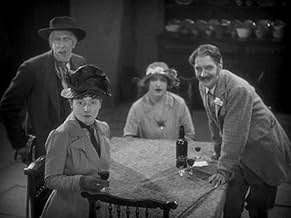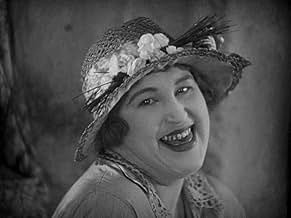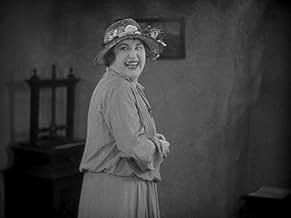NOTE IMDb
5,8/10
3,3 k
MA NOTE
Après le mariage de sa fille, un veuf d'âge mur avec une ferme rentable décide de se remarier, mais trouver une partenaire convenable s'avère un processus problématique.Après le mariage de sa fille, un veuf d'âge mur avec une ferme rentable décide de se remarier, mais trouver une partenaire convenable s'avère un processus problématique.Après le mariage de sa fille, un veuf d'âge mur avec une ferme rentable décide de se remarier, mais trouver une partenaire convenable s'avère un processus problématique.
- Réalisation
- Scénario
- Casting principal
Lillian Hall-Davis
- Araminta Dench - Sweetland's Housekeeper
- (as Lilian Hall-Davis)
Diana Napier
- Sibley Sweetland
- (as Mollie Ellis)
Harry Terry
- Guest at Wedding Breakfast
- (non crédité)
- …
Avis à la une
Slight but enjoyable early Alfred Hitchcock movie about a widower (Jameson Thomas) who sets out to find a new wife with help from his loyal housekeeper (Lillian Hall-Davis). It's a charming and touching story. Not quite what you would expect from the eventual Master of Suspense. It's a good-looking film, as well. Thomas and Davis are both likable. Gordon Harker is fun as the farmer's handyman, Churdles Ash. Love that name. It's nothing to get worked up over but a pleasant enough film that's worth a look to more than just Hitchcock completists.
"The Farmer's Wife" is a charming rustic, semi-romantic comedy from the silent picture era. Without seeing the credits, you might never guess that it was made by the "Master of Suspense", Alfred Hitchcock - but if you know who the director was, it is easy to see the masterful touches Hitchcock was known for.
The story is a simple one. Farmer Sweetland (Jameson Thomas) has lost his beloved wife some time ago, and comes to decide that he should marry again. He methodically evaluates, and plans to propose to, all of the eligible women he can think of. But all the while he overlooks the best, and obvious (to the audience) choice: his devoted housekeeper Araminta (Lillian Hall-Davis, who is charming in the role). "Minta" is far wiser, sweeter, and prettier than the other candidates, and she also cares for Sweetland in a way they never will. The plot, therefore, revolves around whether he will figure this out before he gets stuck with an unsuitable mate instead.
Hitchcock applies the creativity and attention to detail that he would later use in his great suspense films, and makes out of a simple plot a movie that is very funny, and also at times quite touching. A great deal of the characters' feelings and thoughts are communicated without dialogue cards, through masterful silent camera work. The most powerful recurring image is a pair of chairs near the fireplace, where Farmer Sweetland had obviously spent many happy hours with his dear departed first wife. Early in the film, as he hosts a wedding dinner for his daughter, he begins to look longingly at the chairs, and we know what he is thinking even before the dialogue cards tell us. As the film proceeds, we occasionally come back to the fireplace, and eventually "Minta" begins to sit with him by the fireplace, sympathizing and helping with his disappointed matrimonial projects. The suggestion is obvious to everyone but Sweetland.
In the lead role, Thomas responds to Hitchcock's direction, sometimes making his character appear somewhat ridiculous in his miscalculated plans, and at other times evoking our complete sympathy and pity for his loneliness. The rest of the cast works very well too, especially Gordon Harker, whose expert comic timing plays wonderfully in the role of Farmer Sweetland's handyman.
There is one long, hilarious comic sequence, at a house party hosted by one of Sweetland's prospective mates, and you have to watch it two or three times to catch all of the detail Hitchcock packed into the sequence. The rest of the movie is filled with lighter comic touches, and concentrates on giving us a surprisingly tender look at the characters' lives.
Hitchcock fans should take delight in seeing how the master used his talents in such a different genre, and any fan of romantic comedies who is willing to try a silent film should also enjoy "The Farmer's Wife".
The story is a simple one. Farmer Sweetland (Jameson Thomas) has lost his beloved wife some time ago, and comes to decide that he should marry again. He methodically evaluates, and plans to propose to, all of the eligible women he can think of. But all the while he overlooks the best, and obvious (to the audience) choice: his devoted housekeeper Araminta (Lillian Hall-Davis, who is charming in the role). "Minta" is far wiser, sweeter, and prettier than the other candidates, and she also cares for Sweetland in a way they never will. The plot, therefore, revolves around whether he will figure this out before he gets stuck with an unsuitable mate instead.
Hitchcock applies the creativity and attention to detail that he would later use in his great suspense films, and makes out of a simple plot a movie that is very funny, and also at times quite touching. A great deal of the characters' feelings and thoughts are communicated without dialogue cards, through masterful silent camera work. The most powerful recurring image is a pair of chairs near the fireplace, where Farmer Sweetland had obviously spent many happy hours with his dear departed first wife. Early in the film, as he hosts a wedding dinner for his daughter, he begins to look longingly at the chairs, and we know what he is thinking even before the dialogue cards tell us. As the film proceeds, we occasionally come back to the fireplace, and eventually "Minta" begins to sit with him by the fireplace, sympathizing and helping with his disappointed matrimonial projects. The suggestion is obvious to everyone but Sweetland.
In the lead role, Thomas responds to Hitchcock's direction, sometimes making his character appear somewhat ridiculous in his miscalculated plans, and at other times evoking our complete sympathy and pity for his loneliness. The rest of the cast works very well too, especially Gordon Harker, whose expert comic timing plays wonderfully in the role of Farmer Sweetland's handyman.
There is one long, hilarious comic sequence, at a house party hosted by one of Sweetland's prospective mates, and you have to watch it two or three times to catch all of the detail Hitchcock packed into the sequence. The rest of the movie is filled with lighter comic touches, and concentrates on giving us a surprisingly tender look at the characters' lives.
Hitchcock fans should take delight in seeing how the master used his talents in such a different genre, and any fan of romantic comedies who is willing to try a silent film should also enjoy "The Farmer's Wife".
Very funny. I never realized Hitchcock could do slapstick. Surprised to find the story and characters easy to follow and identify with even with the near lack of title cards. The best silent Hitchcock film I have seen and maybe the funniest film he ever made.
This early Hitchcock silent, his first for British International Pictures, is a simple romantic comedy adapted from a stage play. A far cry from crime and suspense, but at this point Hitchcock had neither the influence nor the realisation of his true forte to select his projects.
As with all but one of the Hitchcock silents, the screenplay was by Eliot Stannard. Stannard, with his typical understanding of the visual medium, dispenses with the wordiness of a direct stage-to-screen adaptation. He allows time for the characters to reveal their feelings in reaction shots and point-of-view shots, and replaces verbal gags with visual ones. The Farmer's Wife is thus as devoid of unnecessary intertitles as, say, The Manxman.
Given its rural setting, Hitchcock was more or less obliged to include some shots of rolling hillsides. Hitch doesn't seem to have liked the countryside much – in most of his later films if it appears at all it's as a functional back-projection – but he doesn't do too badly here as far as pure photographic beauty goes. Other than that the shooting style is typical of Hitchcock. There is a growing use of fluid camera movement, and we can see that Hitchcock technique, whereby the camera appears to be leading the audience, gradually revealing to us or drawing us in.
Whether it comes from Stannard's script or Hitchcock's head I don't know, but there is a massive tendency here towards point-of-view shots during dialogue scenes, in which the other speaker looks straight into camera. The majority of these are rather pointless, with the exception of several appropriately ghastly close-ups of the Farmer's bridal candidates.
To say the conclusion of The Farmer's Wife is predictable would be a grand understatement. A shortsighted person could see it coming through several miles of fog. Not a bad thing in itself, but rather than play upon its obviousness (which Stannard and Hitchcock must have been aware of), the picture simply becomes a tedious game of waiting for the inevitable. The Farmer's Wife is only quite funny, and is altogether too long.
As with all but one of the Hitchcock silents, the screenplay was by Eliot Stannard. Stannard, with his typical understanding of the visual medium, dispenses with the wordiness of a direct stage-to-screen adaptation. He allows time for the characters to reveal their feelings in reaction shots and point-of-view shots, and replaces verbal gags with visual ones. The Farmer's Wife is thus as devoid of unnecessary intertitles as, say, The Manxman.
Given its rural setting, Hitchcock was more or less obliged to include some shots of rolling hillsides. Hitch doesn't seem to have liked the countryside much – in most of his later films if it appears at all it's as a functional back-projection – but he doesn't do too badly here as far as pure photographic beauty goes. Other than that the shooting style is typical of Hitchcock. There is a growing use of fluid camera movement, and we can see that Hitchcock technique, whereby the camera appears to be leading the audience, gradually revealing to us or drawing us in.
Whether it comes from Stannard's script or Hitchcock's head I don't know, but there is a massive tendency here towards point-of-view shots during dialogue scenes, in which the other speaker looks straight into camera. The majority of these are rather pointless, with the exception of several appropriately ghastly close-ups of the Farmer's bridal candidates.
To say the conclusion of The Farmer's Wife is predictable would be a grand understatement. A shortsighted person could see it coming through several miles of fog. Not a bad thing in itself, but rather than play upon its obviousness (which Stannard and Hitchcock must have been aware of), the picture simply becomes a tedious game of waiting for the inevitable. The Farmer's Wife is only quite funny, and is altogether too long.
The first half is rather slow, but keep going - it's definitely worth it. The humour in Hitchcock's films is generally based around great character actors (e.g. Jessie Royce Landis in To Catch a Thief and North by NorthWest), and here not one of the actors disappoints. Lillian Hall Davis has a better part in the Ring (also 1928 - Gordon Harker is again very amusing in it too), but is lovely in this film. Sound would have added nothing. My 8-year old daughter was apprehensive about watching a silent film, but once things started to get going in the second half, was hooked.
Hitchcock referred to it in later years as one of his "photographed plays", but the action occurs in several locations, so is nowhere near as constrained as many of his films (plays or not). In fact, even though the location shots are few and far between, they really give this film a non-studio feel.
All of Hitchcock's films are notable for their visual storytelling (look at the initial scene-setting in Rear Window that speaks volumes without a single word being uttered), and it is interesting to see the origins of this, and the great influence of German Expressionism.
Hitchcock referred to it in later years as one of his "photographed plays", but the action occurs in several locations, so is nowhere near as constrained as many of his films (plays or not). In fact, even though the location shots are few and far between, they really give this film a non-studio feel.
All of Hitchcock's films are notable for their visual storytelling (look at the initial scene-setting in Rear Window that speaks volumes without a single word being uttered), and it is interesting to see the origins of this, and the great influence of German Expressionism.
Le saviez-vous
- AnecdotesUnlike most of his later films, this film does not have a cameo by Sir Alfred Hitchcock.
- GaffesAfter Louisa rejects Farmer Sweetland, his horse changes position it between shots as he mounts it.
- Citations
Farmer Sweetland: ...I am a man that a little child can lead but a regiment of soldiers couldn't drive.
- ConnexionsFeatured in The Skin Game (1931)
Meilleurs choix
Connectez-vous pour évaluer et suivre la liste de favoris afin de recevoir des recommandations personnalisées
Détails
Box-office
- Montant brut mondial
- 152 $US
- Durée
- 1h 40min(100 min)
- Couleur
- Mixage
- Rapport de forme
- 1.33 : 1
Contribuer à cette page
Suggérer une modification ou ajouter du contenu manquant






























